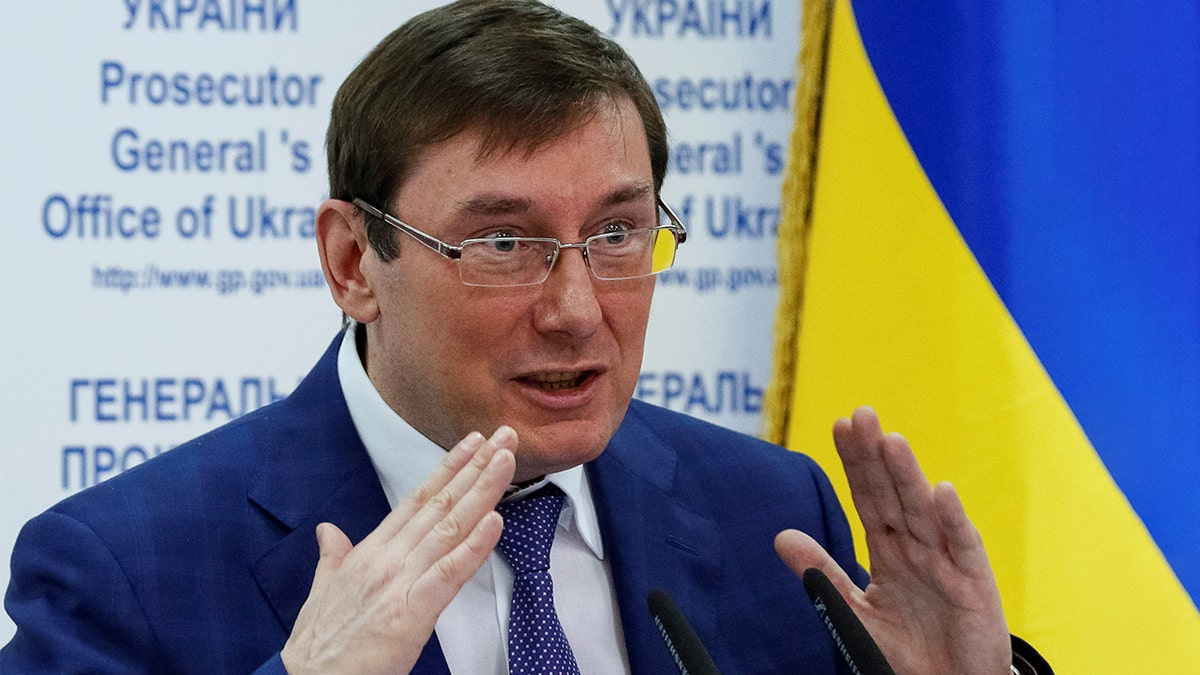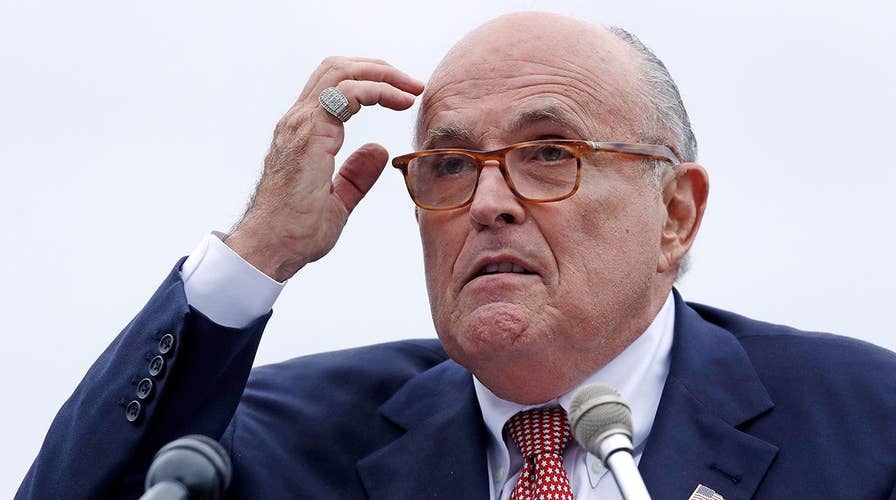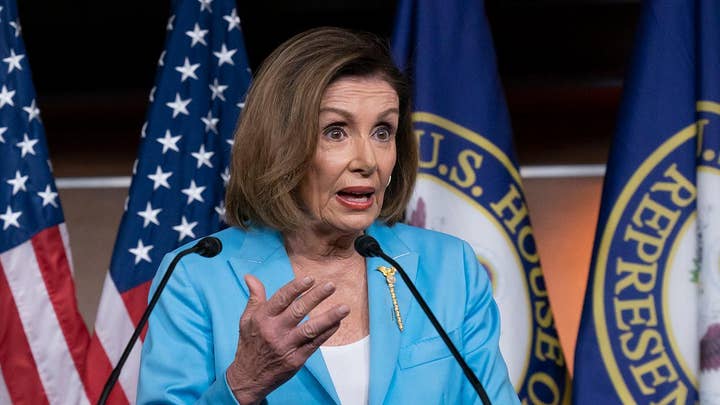Rudy Giuliani says Kurt Volker reached out to him
President Trump's personal attorney Rudy Giuliani provides Fox News with text messages from then-U.S. envoy to Ukraine Kurt Volker; chief intelligence correspondent Catherine Herridge reports from Capitol Hill.
A batch of newly released documents, including court filings as well as notes from interviews conducted by Rudy Giuliani, have put the spotlight back on Biden family dealings in Ukraine—even as House Democrats' impeachment probe zeroes in on President Trump’s push to convince Kiev to investigate them.
And they've raised more questions about how much money Joe Biden's son Hunter made while serving on the board of a Ukrainian natural gas firm at the center of the controversy, with one estimate putting the figure in the "millions."
Among the documents, as Fox News reported Wednesday, are notes from an interview Trump attorney Giuliani conducted with fired Ukrainian prosecutor Viktor Shokin earlier this year, in which he claimed he was told by former U.S. Ambassador to Ukraine Geoffrey R. Pyatt to back off an investigation involving that firm, Burisma Holdings, and its founder. According to interview notes, Shokin claimed Pyatt -- currently the ambassador to Greece -- told him to handle that investigation “with white gloves.”
EX-UKRAINIAN PROSECUTOR SAID HE WAS TOLD TO BACK OFF PROBE OF BIDEN-LINKED FIRM, FILES SHOW
Shokin said his “investigations stopped out of fear of the United States.”
In that interview, Shokin also claimed that former Ukrainian President Petro Poroshenko told him he should not investigate Burisma, “as it was not in the interest of Joe and/or Hunter Biden.” Shokin claimed Poroshenko told him that due to his investigation, Joe Biden held “up to one billion dollars in U.S. aid to Ukraine.” Poroshenko eventually removed Shokin.
Biden's campaign and congressional Democrats reject these allegations, maintaining that Biden was only involved due to corruption concerns surrounding Shokin and casting Giuliani's claims as "debunked conspiracy theories."
The interview notes, though, align with a European court affidavit from Shokin, which was published by The Hill last week. The affidavit came as part of an Austrian extradition case involving another wealthy Ukrainian businessman, Dmitry Firtash.
The sworn affidavit states that Poroshenko asked him to resign “due to pressure from the U.S. Presidential administration, in particular from Joe Biden.”
“On several occasions, President Poroshenko asked me to have a look at the criminal case against Burisma and consider the possibility of winding down the investigative actions in respect of this company,” he continued. “But I refused to close this investigation.”
Shokin went on to state he was “forced to leave office, under direct and intense pressure from Joe Biden and the US administration.”

Prosecutor-General of Ukraine Viktor Shokin speaks during a news conference in Kiev, Ukraine, November 2, 2015. Picture taken November 2, 2015. REUTERS/Valentyn Ogirenko - GF10000363693
“In my conversations with Poroshenko at the time, he was emphatic that I should cease my investigations regarding Burisma,” he stated. “When I did not, he said that the US (via Biden) were refusing to release the USD$ 1 billion promised to Ukraine. He said that he had no choice, therefore, but to ask me to resign.”
Despite his claims, Shokin, on both sides of the Atlantic, had been widely accused of corruption.
“His reputation for investigating corruption in Ukraine—whether it had to do with Hunter Biden’s firm or the broader plague of deep, embedded and systematic corruption in Ukraine—he didn’t have a shining reputation,” John Hannah, former national security adviser to former Vice President Dick Cheney, told Fox News' “America’s Newsroom” Thursday. “He wasn’t simply opposed by the U.S. administration at that time ... but by the entire trans-Atlantic alliance in Europe.”
Hannah added that if Shokin has “real evidence” that “intense pressure was brought on him to go easy on Hunter Biden,” he should come forward. “But knowing this guy’s reputation, I’m a little skeptical of the charges he’s making at this point in time, but we need to get the facts, obviously,” Hannah said.
Poroshenko has also told reporters that Biden never asked him to open or close any cases.
Yet Fox News has obtained notes from another interview Giuliani conducted—with Yuriy Lutsenko, the former Ukrainian prosecutor who replaced Shokin and eventually closed the Burisma probe.

Prosecutor-general of Ukraine Yuri Lutsenko attends a news conference in Kiev, Ukraine, May 30, 2016. REUTERS/Gleb Garanich - D1BETHAMTIAA
According to the notes of the interview, conducted in New York City in January 2019, Lutsenko said he “believes Mr. Viktor Shokin ... is honest.”
Lutsenko, in the interview notes, did not weigh in on why the investigation into Burisma was closed or Biden’s involvement -- but did say he “believes Hunter Biden receives millions of dollars in compensation from Burisma.”
It is unclear how much money Hunter Biden made while serving on the board of the firm, but reports have estimated he made up to $50,000 per month. With reports indicating he served for about five years, he could have made millions at that rate.
Allies of Biden have maintained that his intervention prompting the firing of Shokin had nothing to do with his son, but rather was tied to the corruption concerns.
DEMOCRATS SET SIGHTS ON BARR IN EVER-EXPANDING INVESTIGATION
But the new material is being touted by Trump allies, as they try to turn the tables on Democrats investigating him for trying to pressure Ukraine into investigating the family.
Trump even doubled down on those calls, telling reporters Thursday: “I would think that if they were honest about it, they would start a major investigation into the Bidens.”
In a statement to Fox News on Wednesday, Giuliani said the interviews were conducted before Biden announced his presidential run and the allegations were brought to him.
“I explored them as part of my duty as an attorney to show that the crimes committed, were not by my client, but by Democrats. I was not seeking to investigate Joe Biden. I was not investigating Joe Biden,” Giuliani said.
The notes from Giuliani’s interviews were shared with Fox News by sources familiar with the “urgent” briefing held by State Department Inspector General Steve Linick on Wednesday with aides from top congressional committees. A State Department spokesman confirmed that Linick shared “relevant” files with Congress.
Linick told aides in the meeting that he received the files in the spring but did not know the sender. Fox News has learned that the original sender was, in fact, Giuliani. Linick forwarded the files to the FBI for further investigation in June, but last week, was given permission by the FBI to share the files with Congress and said they were relevant to congressional interviews being conducted, according to sources.
But Democrats are casting the documents as a disinformation campaign to distract from Trump controversies.
“The documents provided by the inspector general included a package of disinformation, debunked conspiracy theories, and baseless allegations in an envelope marked ‘White House’ and containing folders labeled ‘Trump Hotel,’” House Intelligence Committee Chairman Adam Schiff, Foreign Affairs Chairman Eliot Engel and Oversight Chairman Elijah Cummings said in a statement.
“These documents also reinforce concern that the president and his allies sought to use the machinery of the State Department to further the president’s personal political interests.”
The new documents surfaced amid the uproar surrounding Trump’s July 25 phone call with Ukrainian President Volodymyr Zelensky, in which he sought an investigation into the Bidens’ Ukraine dealings. That phone call sparked an impeachment inquiry in the House of Representatives and has the Trump administration facing a new round of subpoenas. The inquiry was touched off by a still-anonymous whistleblower's complaint.
Democrats have claimed that the call revealed a quid pro quo, saying Trump tied his request to investigate the Bidens to military aid. Trump reportedly ordered his staff to freeze nearly $400 million in aid to Ukraine a few days before the phone call with Zelensky, a detail that fueled impeachment calls. However, the call transcript did not show Trump explicitly mentioning the aid as a bargaining chip, and Trump has denied doing so.






